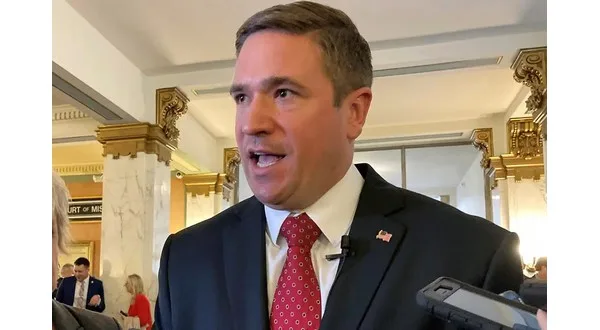
Missouri Attorney General Andrew Bailey speaks to reporters after taking the oath of office in Jefferson City on Jan. 3, 2023. (Photo courtesy of Associated Press)
Missouri’s attorney general has sued Planned Parenthood and President Joe Biden, tried to force clinics that provide gender-affirming care to hand over their records, and pushed a liberal prosecutor to resign.
Despite those decidedly conservative moves, some prominent conservative groups from outside Missouri are spending millions ahead of the Aug. 6 primary to boost Andrew Bailey’s opponent, Will Scharf, a member of former President Donald Trump’s legal team. In the GOP-dominated state, the primary winner has a huge advantage in November’s general election.
The tumult demonstrates how important state attorneys general have become as they’ve taken on increasingly nationalized roles in addition to using the positions as springboards to run for governor or U.S. Senate. Both senators representing Missouri previously served as AG.
“It is part of the broader universe of AGs and where we’re at now in terms of the funding for these races,” said Paul Nolette, a Marquette University political scientist who studies state attorneys general and has observed them digging into issues such as abortion and LGBTQ+ rights. “That money makes it less likely for the AGs to break out of their commitment to their ideological poles and oftentimes culture war approach to issues.”
State attorneys general are lawyers who represent the state government. AGs are appointed in some states but elected in 43. Some are their states’ top criminal prosecutors; all of them have major consumer affairs roles. They’ve long crossed party lines to protect consumers, such as with joint lawsuits against the opioid industry and tech companies.
AGs have become far more partisan in the past decade, however, with many – like Bailey – suing the federal administration over policies when the president is of the opposing party.
For instance, nearly every Republican AG has filed a lawsuit objecting to the Biden administration’s regulations mandating that transgender students be protected under a gender equality law. A group of Democratic AGs has begun legal filings in support of the regulations.
The political operation around state AGs has gotten stronger, too. The Republican Attorneys General Association, which is dedicated to electing Republican AGs, became its own entity in 2014 after splitting off from a group devoted to electing GOP lawmakers and other state officials. Two years later, the Democratic Attorneys General Association, moved from Colorado to Washington, D.C., and added full-time staff.
Now, the groups pour money into the most competitive races, often in the form of independent expenditures that pay for attack ads.
RAGA, which normally supports GOP AG incumbents, has stayed out of the Missouri primary. Some of the association’s biggest contributors, however, are backing Scharf. They’re doing so by making contributions to a Missouri arm of Club for Growth, a major funding power that focuses on aiding fiscally conservative candidates and which, in turn, is airing ads to boost Scharf and criticize Bailey.
The group has received $1 million this year from Leonard Leo, a political funding powerhouse who serves as co-chair of the conservative Federalist Society, and another $1 million from the Concord Fund, which is part of Leo’s vast network. The Concord Fund, previously known as the Judicial Crisis Network, is best know for trying to create a more conservative federal judiciary. It’s usually a major RAGA supporter, contributing more than $10 million to that group since 2020.
The fund backing Scharf has also received $1.4 million this year from investor Paul Singer and $500,000 from the national Club for Growth.
It’s not unheard of for national conservatives to try to oust an incumbent Republican AG. Two years ago, a separate arm of Club for Growth spent more than $280,000 on ads attacking longtime Idaho AG Lawrence Wasden in the Republican primary. His opponent, U.S. Rep. Raul Labrador, defeated him and went on to win the general election in November.
Club for Growth PAC President David McIntosh last year praised Scharf for economic positions, such as promoting tax cuts.
Leo has not publicly explained the support of his network and his representative did not respond to interview requests.
But Scharf fits the mold of some of the Federalist Society-connected lawyers who have risen through the ranks of the government legal system with resumes that include elite law schools, clerkships with Republican-appointed federal judges and strong ties to the GOP.
He received his undergraduate degree from Princeton University, his law degree from Harvard University, clerked for two federal appeals court judges and has worked at CRC advisors, a conservative public relations firm chaired by Leo. In addition to being one of Trump’s lawyers, he has worked as an assistant U.S. Attorney in St. Louis, and worked on the campaign and later in the office of then-Missouri Gov. Eric Greitens. A representative for Scharf said he would be available for an interview but did not reply to later follow-up email, text and voicemail messages from The Associated Press.
“I’m surprised that Wall Street and coastal elites would want to buy an office in Missouri for a New Yorker,” Bailey said of Scharf in an interview. He said Scharf would be the kind of candidate that those funders could control.
Bailey has spent nearly his entire career in Missouri. The Army veteran received his undergraduate and law degrees at the University of Missouri, worked in the state attorney general’s office, and was an assistant county prosecutor and a state government lawyer before joining the office of Gov. Mike Parson, who eventually appointed him as attorney general.
Liberty and Justice PAC, an effort supporting Bailey, has also attracted major contributions. The biggest was $500,000 from Carolyn and Mike Rayner, St. Louis-area residents who are part of the family that owns the agribusiness firm Cargill, Inc.
WebReadyTM Powered by WireReady® NSI










